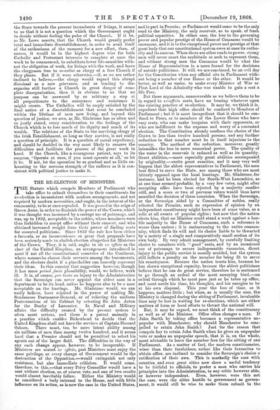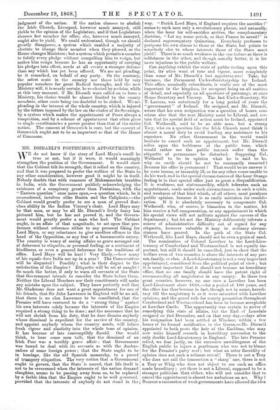THE RE-ELECTION OF MINISTERS.
THE Statute which compels Members of Parliament who take office to submit themselves to their constituents for re-election is inconsistent with modern arrangements, and not required by modern necessities, and ought, in the interest of the community, to be at once repealed. It was passed in the reign of Queen Anne, in order to diminish the power of the Crown, which it was thought was increased by a corrupt use of patronage, and was, up to 1832, acceptable to the nobles, whose nominees were thus forbidden to accept office without their consent, and who obtained increased weight from their power of finding seats for unseated politicians. Since 1832 the rule has been either a formula, or an inconvenience so great that proposals have been seriously made to abolish election altogether for Ministers of the Crown. They, it is said, ought to sit ex officio as the elect of the United Kingdom, an arrangement introduced in most if not all the constitutional countries of the Continent, where monarchs choose their servants among the bureaucrats, and the electors doubt if a placeholder can honestly represent their ideas. In this country that suggestion however, though it has some prima facie plausibility, would, we believe, work ill. It is, of course, pro tanto an injury to the Administration that the Sovereign can never appoint the ablest man in a department to be its head, unless he happens also to be a man acceptable on the hustings. Mr. Gladstone would, we can easily believe, have rejoiced in the power of making Mr. Scudamore Postmaster-General, or of relieving the uniform Protestantism of his Cabinet by selecting Sir John Acton for the Duchy of Lancaster. In Naval and Military affairs the difficulty created by the present system is often most serious, and there is a patent anomaly in a practice which enables Birkenhead to decide that the United Kingdom shall not have the services of Captain Sherard Osborn. There must, too, be more latent ability among six millions of men than among twelve hundred, and it seems hard that a Premier should not be permitted to select his agents out of the larger field. The difficulties in the way -of any such change appear, however, to be insuperable. If Ministers are seated ex officio, past Ministers must enjoy the same privilege, or every change of Government would be the destruction of the Opposition,—would extinguish not only resistance, but also immediate criticism. It would come, therefore, to this,—that every Privy Councillor would have a seat without election, or, of course, vote, and one of two results would almost inevitably follow. Either the Ministry would be considered a body external to the House, and with little influence on its action, as is now the case in the United States, and in part in Prussia; or Parliament would cease to be the only road to the Ministry, the only reservoir, so to speak, of fresh political capacities. In either case, the loss to the governing power and popular prestige of the House of Commons would be enormous, and it is to the exceptional power and prestige of that great body that our constitutional system owes at once its autho- rity and its success. When there are other roads to power, strong men will never court the multitude or seek to represent them, and without strong men the Commons would be what the House of Representatives is, a mere funnel for the decisions. of outside politicians. It will, we are convinced, be an evil day- for the Constitution when any official sits in Parliament with- out being a member of one House or the other. It would be- better, as well as easier, to make every Minister of War or First Lord of the Admiralty who was unable to gain a seat a. life Peer.
But these arguments, unanswerable as we believe them to be' in regard to ex-officio seats, have no bearing whatever upon the existing practice of re-election. It may be, we think it is, expedient that high office should be confined to Members of Parliament ; but it is most inexpedient that it should be con- fined to Peers, or to members of the Lower House who have easy seats, who can make bargains with their opponents, or who are indifferent to the expense and worry of a contested election. The Constitution already confines the choice of the. Crown to less than twelve hundred persons, and any further reduction in that number must be in itself injurious to the- coun try. The method of the reduction, moreover, greatly intensifies the loss in mere numerical power. The quality of the water in the reservoir is reduced as well as its quantity_ Great abilities,—more especially great abilities accompanied by originality,—excite great enmities, and it may very well happen that the ablest representatives in Parliament, the men best fitted to serve the State, are among those who are most bitterly opposed upon the local hustings. Mr. Gladstone, for instance, had he been elected for South-West Lancashire, as- at one time seemed probable, by a very few votes, might after accepting office have been rejected by a malority smaller still, and a score or two of perverse voters would thus have' annulled the decision of three countries. When the Sovereign, or the Sovereign aided by a Committee of nobles, really selected the Premier, such an expression of opinion by an independent constituency might have been of some value, as a relic at all events of popular rights ; but now that the nation elects him, that no Minister could stand a week against a hos-- tile majority in the House of Commons, such a reference is worse than useless ; it is embarrassing to the entire commu- nity, which finds its will and its choice liable to be thwarted by a moiety of a single and comparatively small section of its own body. By very adroit management, by carefully limiting- choice to members with "good" seats, and by an occasional use of patronage to secure indispensable vacancies, direct injury to the public service is usually avoided, but the systera still inflicts a penalty on the member for being fit to serve- his countrymen. Because the nation trusts him, because he has shown exceptional capacity, because the ablest politicians believe that he can do great service, therefore he is sentenced to go through an ordeal of the most annoying kind,—an ordeal through which he must pass just as he takes up office, and most needs his time, his thoughts, and his energies to be at his own disposal. This year the loss of time, as it happens, matters little ; but when, as is usually the case, the Ministry is changed during the sitting of Parliament, invaluable time may be lost in waiting for re-elections, which are either matters of form or local efforts to thwart the national will.
But, it may be argued, we must think of the constituency as well as of the Minister. Office often changes a man. If John Smith by taking office becomes a representative un- popular with Manchester, why should Manchester be com- pelled to retain John Smith ? Just for the reason that compels her to retain John Smith when he gives an unpopular vote or makes an unpopular speech, that it is, on the whole, most advisable to leave the member free for the sitting of one- Parliament. As a matter of fact, the modern constituencies, wiser than their forefathers, rather like their favourites ta obtain office, are inclined to consider the Sovereign's choice a ratification of their own. This is markedly the case with counties, and even great cities now show a useful tendency to be faithful to officials, to prefer a man who carries his- principles into the Administration, to any critic however able, or however independent. Even, however, were this not the case, were the cities hostile to government as govern- ment, it would still be wise to make them submit to the
judgment of the nation. If the nation chooses to abolish the Irish Church, Liverpool, however much annoyed, still yields to the opinion of the Legislature, and if that Legislature chooses her member for office, she, however much annoyed, ought also to yield. We could understand, though we should greatly disapprove, a system which enabled a majority of electors to change their member when they pleased, as the House changes Ministers ; but a system which permits a member to falsify every pledge without compelling him to resign, but makes him resign because he has an opportunity of carrying his pledges into effect, needs at all events a stronger defence than any which has yet been offered. We are not pleading, be it remarked, on behalf of any party. On the contrary, the safest seats in the country are those held by very popular members for great Radical boroughs, and the new Ministry will, it is nearly certain, be re-elected by acclaim, while at this very moment, if Mr. Disraeli were called on to form a Ministry, his choice would be almost limited to the county members, other seats being too doubtful to be risked. We are pleading in the interest of the whole country, which is injured by the fetters imposed by the law on the choice of its Sovereign, by a system which makes the appointment of Peers always a temptation, and by a scheme of appointment that often gives to single constituencies a power greater than that of the entire nation. The consent of Greenwich is sure, but the consent of Greenwich ought not to be as important as that of the House of Commons.







































 Previous page
Previous page